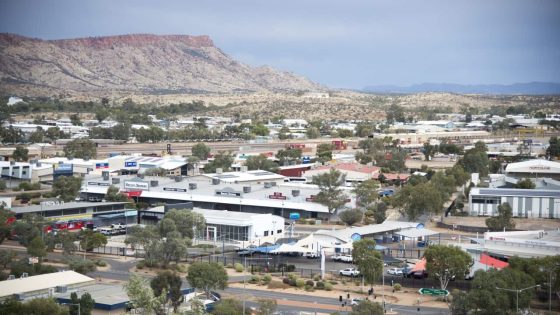Alice Springs urgently needs a long-term plan to prevent further eruptions of violence, advocates say, after the Northern Territory town emerged from a snap three-night curfew.
Northern Territory Police announced a public disorder declaration on Monday, implementing a . It applied to an area of the town centre between 10pm and 6am.
The curfew had been imposed as a “pressure-relief valve” for law enforcement officers after a string of violent incidents at the weekend, Chief Minister Eva Lawler said at the time.
The NT police commissioner announced on Thursday that the curfew would not be extended.
Commissioner Michael Murphy said in a statement that there were “no reasonable grounds” for him to extend the curfew.
The declaration followed a weekend of violence in the central desert town that included a brawl involving 80 people, a knife attack on a 42-year-old woman, the robbery of a service station and the assault of four off-duty police officers.
People with legitimate business in the area, such as work or attending an event, and those seeking safety or medical treatment were permitted to enter the zone.
Murphy said in a statement that, in the three days the curfew was in effect, police had engaged with 159 people, directing 93 to leave the area.
Twenty were conveyed to the “care of other agencies” and 18 were removed from the area by police. No arrests were made in relation to the declaration.
Murphy said the declaration had a “noticeable effect” in preventing public disorder and thanked the Alice Springs community “for working with us”.
“The [public disorder declaration] is not a long-term solution, and I am mindful of the impact that decision has had on the broader community.”
The emergency declaration announced on Monday was permitted under laws urgently passed by the Northern Territory parliament in May.
Under the laws, the police commissioner has the power to impose a three-day curfew, which can be extended to seven days by the police minister if the commissioner requests it.
‘Thirty years of policy on the run’
Alice Springs Mayor Matt Paterson said the curfew had worked to reduce violent incidents but called for longer-term solutions to address issues in the community.
“This is 30 years of policy on the run that’s got Alice Springs and central Australia to where we are, and it’s decisions driven out of Canberra and Darwin,” he told ABC News.
“There is a vision for a long-term plan, and I think that that is welcomed.
“But what we need to do is speed that process up, because there will be no requirement for a long-term plan if these things continue in Alice Springs because it will drive good residents out of the community.”
NT Opposition leader Lia Finocchiaro blamed the territory’s Labor government for exacerbating crime, by watering down laws and failing to back the police.
“It is decimating our tourism industry and seeing hundreds of Territorians leave every single year,” she said.
Law and order will be a key issue for the Lawler government at the August election as Labor seeks a third term.


